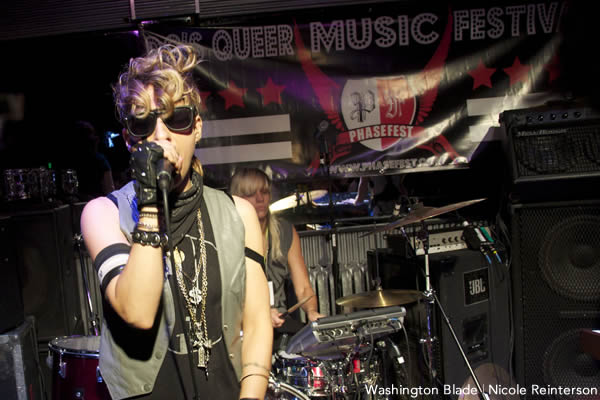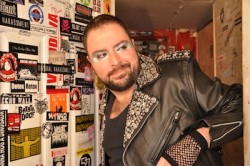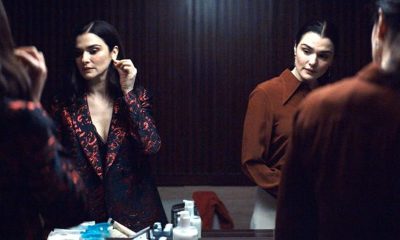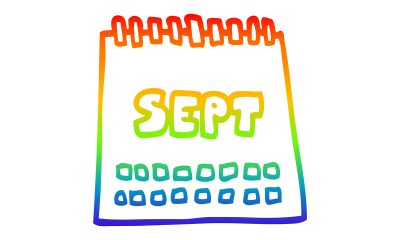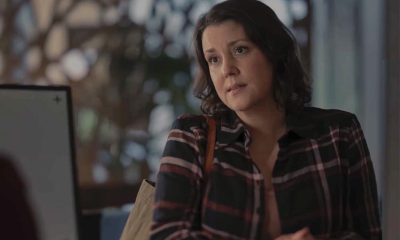Arts & Entertainment
Musical mayhem
Phasefest gives queer bands platform in D.C. this weekend
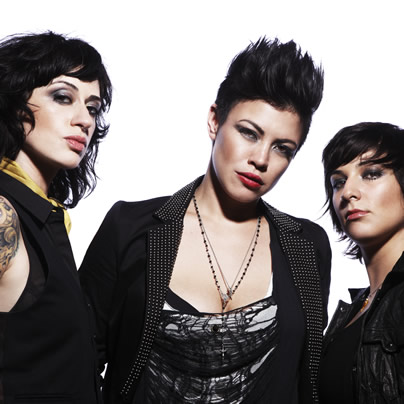
Phasefest
Continues through Saturday
Phase 1
525 8th Street, S.E.
$20 for tonight; $25 for Saturday
Weekend passes available for $55
Tickets available at the door
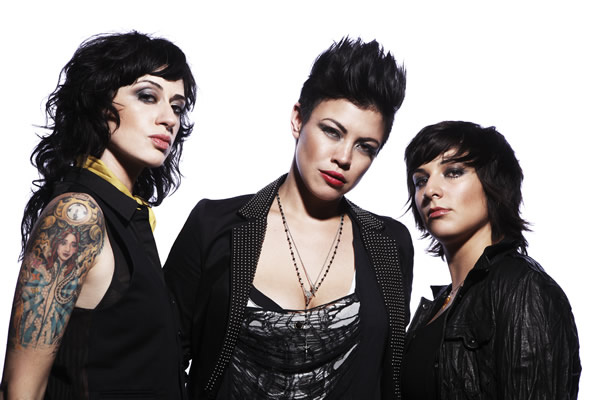
Hunter Valentine is, from left, Vero Sanchez (bass), Kiyomi McCloskey (vocals/guitar) and Laura Petracca (drums). (Photo by Leslie Van Stelten)
Ordinarily Somer Bingham likes to hang out at Phasefest whether she’s playing that night or not.
The musician behind Clinical Trials has played Phasefest the past four years and is up again for a mini-set tonight. During a phone chat this week from West Hollywood where she’s getting ready for a solo show, she says it’s probably best she’s not planning to be at Phasefest on Saturday night. There’s a little drama that’s gone down with her old group, Hunter Valentine, the headline band for Saturday.
“It’s probably best I won’t see them since I just got kicked out of the band,” Bingham says. “I was never technically a full member, but we played together almost six months. They kind of decided I just wasn’t the right fit. Kiyomi (McCloskey, lead singer of Hunter Valentine) and I just weren’t getting along as band mates and it kind of just exploded.”
Fans of the Showtime reality show “The Real L Word” know the story — the drama played out in July and August during the series’ tense third season, a segment of which was filmed at Phase 1 in March.
But the drama should be avoided at Phasefest where the focus will be on the music. For the record, though, Bingham is pragmatic about the way things went down.
“We definitely wrote some cool songs together and played some great shows,” she says. “I thought we had good chemistry, but it’s such a bummer because we were great friends before.”
McCloskey says they “parted ways amicably.”
“Playing with Somer was always meant to be a trial run,” she says. “She didn’t know whether she wanted to be in the band permanently and we didn’t know whether she was the right fourth member. She is an amazing musician but it turned out not the right fit for Hunter Valentine. We wish her the best.”
Bingham says she played on about half of the cuts on the new Hunter Valentine album, “Collide and Conquer,” slated to drop Oct. 23 on Megaforce Records.
McCloskey says her band will definitely include songs from that project in their hour-long set Saturday night.
“The album’s been streaming on our site for a couple weeks, we actually just took it down,” she says. “But the fans have gotten a chance to hear it and people are really pumped. It has a great range of everything from guitar rock to ballads to mid-tempo pop songs. We’re really proud of the wide range there and we think it shows the most growth we’ve had in the band so far.”
For Bingham, Hunter Valentine was never her only musical outlet. She’s been doing Clinical Trials for about eight years in between her time working as a sound engineer in New York, where she lives. She calls Trials a “PJ Harvey-meets-Nirvana-meets a little more production-with some MIA and weird samples thrown in.”
She says the high quality of Phasefest, now in its sixth year and one of the few queer-specific music festivals in the country, keeps her coming back.
“These bands don’t just happen to be queer,” she says. “It’s all really great music. … All genres are represented. You’ll find something there you like musically and it will also be really high caliber.”
Phase 1 manager Angela Lombardi, who launched the festival, expects about 700 people to visit the bar this weekend, a number they’ve roughly been holding steady at for the past few years. She says about 75 percent of the bands slated for this year are returning acts.
“I do get some shit about it. People sometimes say, ‘Why not try to create an entirely new festival every year?’ Lombardi says. “But these are all bands I really love and people I really care about. I’ve become friends with many of them and so for me, it’s really about supporting great queer artists.”
It’s not a hard-and-fast rule that all the bands have LGBT members, but Lombardi can only think of one band that played there once that didn’t have at least one queer member.
And she says as time has gone on, the original Phase 1 — widely thought to be the oldest continually operating lesbian bar in the U.S. — has retained its own identity from its sister location in Dupont Circle which opened in February at the old Apex/Badlands location on 22nd Street. They were never meant to be the same experience and though Lombardi helped open that location, the two Phase spots operate largely independently of each other. All the Phasefest events will continue to be at the original Phase in Eastern Market.
“We did talk about the possibility of having one night (of Phasefest) there, but at the end of the day, we felt like offering the same festival experience people have come to expect from us was the best way to go,” she says. “We kind of thought if we go bigger, it will change to the point that it’s not this thing we love and think is great. We love this space and the feeling here and so after all the discussion, we just decided to keep it real and kept it at the original Phase.”
But did the new Phase cut into the original Phase’s customer base?
“We’re making it happen,” Lombardi says. “Some people go back and forth, but we’re always doing crazy shit at the original Phase. As of right now, we’re making it work.”
Alongside bands with national exposure and following like Hunter Valentine are indie local bands like Glitterlust, which played only its fourth date at last year’s Phasefest. Lead singer Mikey Torres — Glitterlust is the only male-fronted band on the roster this year — says Phasefest was “our first real show.”
“I was actually just watching the YouTube video of our set from last year and it’s really amazing how much we’ve evolved in that time,” Torres says. “We’ve played a lot more shows since then and added a lot more interactive elements. Everything’s just a lot bigger and amped up. Our focus now is making everything larger than life.”
So why is it important for queer bands to have outlets such as Phasefest at which to play? Isn’t it best to infiltrate the mainstream as much as possible for queer visilibity?
“I live for music so being able to support music that I know has endured some sort of hardship just be existing and giving them a safe space to perform in a totally queer rock and roll environment, it’s really a great thing,” Lombardi says. “It’s also just totally rad to have one space where you can go and hear a lot of bands. Yeah, it’s fun to go hear the Scissor Sisters and these great shows, but more often than not, you’re just hearing one band. This also gives some of our local bands some chances to perform alongside the bigger bands who have more national followings.”
Torres agrees.
“Even if we were fully accepted in mainstream society, we’ll always need our own spaces,” he says. “It’s great to have acceptance, but sometimes I just need to be with my gay friends. There’s a dialogue that can happen there that doesn’t happen with straight people. You can unwind most around the people you’re totally comfortable with.”

Team DC, the umbrella organization for LGBTQ-friendly sports teams and leagues in the D.C. area, held its annual Night of Champions Awards Gala on Saturday, April 20 at the Hilton National Mall. The organization gave out scholarships to area LGBTQ student athletes as well as awards to the Different Drummers, Kelly Laczko of Duplex Diner, Stacy Smith of the Edmund Burke School, Bryan Frank of Triout, JC Adams of DCG Basketball and the DC Gay Flag Football League.
(Washington Blade photos by Michael Key)




















The 2024 National Cannabis Festival was held at the Fields at RFK Stadium on April 19-20.
(Washington Blade photos by Michael Key)
















Covering the @NatlCannaFest at RFK Stadium for @WashBlade . Stop by the LGBTQ+ booth and pick up a paper if you are here. pic.twitter.com/is7hnsaPns
— Michael Patrick Key (@MichaelKeyWB) April 20, 2024
Theater
‘Amm(i)gone’ explores family, queerness, and faith
A ‘fully autobiographical’ work from out artist Adil Mansoor

‘Amm(i)gone’
Thorough May 12
Woolly Mammoth Theatre
641 D St., N.W.
$60-$70
Woollymammoth.net
“Fully and utterly autobiographical.” That’s how Adil Mansoor describes “Amm(i)gone,” his one-man work currently playing at Woolly Mammoth Theatre.
Both created and performed by out artist Mansoor, it’s his story about inviting his Pakistani mother to translate Sophocles’s Greek tragedy “Antigone” into Urdu. Throughout the journey, there’s an exploration of family, queerness, and faith,as well as references to teachings from the Quran, and audio conversations with his Muslim mother.
Mansoor, 38, grew up in the suburbs of Chicago and is now based in Pittsburgh where he’s a busy theater maker. He’s also the founding member of Pittsburgh’s Hatch Arts Collective and the former artistic director of Dreams of Hope, an LGBTQ youth arts organization.
WASHINGTON BLADE: What spurred you to create “Amm(i)gone”?
ADIL MANSOOR: I was reading a translation of “Antigone” a few years back and found myself emotionally overwhelmed. A Theban princess buries her brother knowing it will cost her, her own life. It’s about a person for whom all aspirations are in the afterlife. And what does that do to the living when all of your hopes and dreams have to be reserved for the afterlife?
I found grant funding to pay my mom to do the translation. I wanted to engage in learning. I wanted to share theater but especially this ancient tragedy. My mother appreciated the characters were struggling between loving one another and their beliefs.
BLADE: Are you more director than actor?
MANSOOR: I’m primarily a director with an MFA in directing from Carnegie Mellon. I wrote, directed, and performed in this show, and had been working on it for four years. I’ve done different versions including Zoom. Woolly’s is a new production with the same team who’ve been involved since the beginning.
I love solo performance. I’ve produced and now teach solo performance and believe in its power. And I definitely lean toward “performance” and I haven’t “acted” since I was in college. I feel good on stage. I was a tour guide and do a lot of public speaking. I enjoy the attention.
BLADE: Describe your mom.
MANSOOR: My mom is a wonderfully devout Muslim, single mother, social worker who discovered my queerness on Google. And she prays for me.
She and I are similar, the way we look at things, the way we laugh. But different too. And those are among the questions I ask in this show. Our relationship is both beautiful and complicated.
BLADE: So, you weren’t exactly hiding your sexuality?
MANSOOR: In my mid-20s, I took time to talk with friends about our being queer with relation to our careers. My sexuality is essential to the work. As the artistic director at Dreams of Hope, part of the work was to model what it means to be public. If I’m in a room with queer and trans teenagers, part of what I’m doing is modeling queer adulthood. The way they see me in the world is part of what I’m putting out there. And I want that to be expansive and full.
So much of my work involves fundraising and being a face in schools. Being out is about making safe space for queer young folks.
BLADE: Have you encountered much Islamophobia?
MANSOOR: When 9/11 happened, I was a sophomore in high school, so yes. I faced a lot then and now. I’ve been egged on the street in the last four months. I see it in the classroom. It shows up in all sorts of ways.
BLADE: What prompted you to lead your creative life in Pittsburgh?
MANSOOR: I’ve been here for 14 years. I breathe with ease in Pittsburgh. The hills and the valleys and the rust of the city do something to me. It’s beautiful, it’ affordable, and there is support for local artists. There’s a lot of opportunity.
Still, the plan was to move to New York in September of 2020 but that was cancelled. Then the pandemic showed me that I could live in Pittsburgh and still have a nationally viable career.
BLADE: What are you trying to achieve with “Amm(i)gone”?
MANSOOR: What I’m sharing in the show is so very specific but I hear people from other backgrounds say I totally see my mom in that. My partner is Catholic and we share so much in relation to this.
I hope the work is embracing the fullness of queerness and how means so many things. And I hope the show makes audiences want to call their parents or squeeze their partners.

